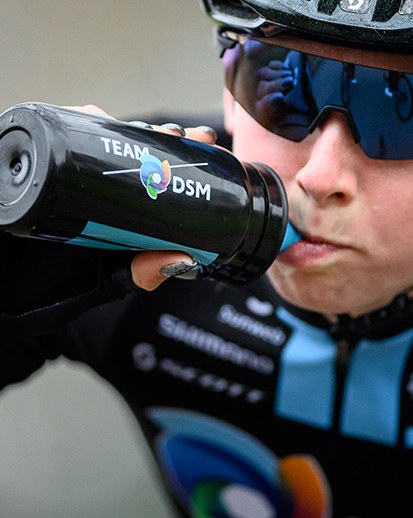Non-financial reporting policy
Reporting policy and justification of choices made
In this Report, we report for the calendar year 2020. The company reports on People, Planet and Profit information in such a Report on an annual basis. The previous DSM Integrated Annual Report was published on 27 February 2020. We publish our Report exclusively in a digital format. It is available as an online version and as a pdf.
In the Report by the Managing Board, we explain our vision and policy with respect to sustainability practices and report on our activities in this field during 2020. In addition to disclosing data and developments in the categories of People, Planet and Profit, we also report on the global societal megatrends that drive our strategy, sustainability governance framework, stakeholder engagement activities, and management approach on material topics. We proactively seek out the views of key stakeholders on issues of material importance to the company.
Global Reporting Initiative
At DSM, we base our sustainability reporting on international non-financial reporting guidelines. We frequently assess to what extent sustainability aspects become material to our company and our stakeholders. In the event that specific indicators become relevant to the company’s sustainability performance, appropriate actions are taken that allow the necessary data to be collected so as to be able to disclose progress in the future.
This Report has been prepared in accordance with the GRI Standards: Comprehensive option. A detailed overview of how we report according to the GRI Standards comprehensive indicators, including a reference to relevant sections in this Report, is provided in the GRI Content Index on the Integrated Annual Report website.
UN Global Compact
We have been a signatory to the UN Global Compact since 2007 and commit to annually report on progress in implementing The Ten Principles of the UN Global Compact in the areas of human rights, child and forced labor, the environment and anti-corruption. This Report is our Communication on Progress 2020, submitted to the UN Global Compact Office. Our Code of Business Conduct, our Sustainability, Human Resources, and Safety, Health and Environment (SHE) policies, and our Supplier Sustainability Program are the foundations on which we apply the standards of the Global Compact.
We have also aligned our strategy with the Sustainable Development Goals (SDGs). We are familiar with the opportunities and responsibilities that the SDGs represent for our business. Based on our mapping, we believe that we contribute to all of them, and have chosen to focus on the goals which most closely align with our strategic ambitions. In this Report, we continue to include the SDGs into our reporting process, for example by mapping SDG reporting priorities in our value creation model, our material topics, and the solutions that we highlight.
The Taskforce on Climate-related Financial Disclosures
The recommendations from the Taskforce on Climate-related Financial Disclosures (TCFD) are a set of voluntary, climate-related financial disclosures for use by companies to provide information to their stakeholders. We were among the first companies in 2017 to commit to implementing, as fully as practicable, these recommendations over the following three years as outlined in the TCFD’s implementation path. This Report contains our TCFD-relevant disclosures on Governance, Strategy, Risk Management, and Metrics and Targets. For more information on how we report against the TCFD recommendations, see the Sustainability statements — TCFD.
Other reporting frameworks
We are in favor of convergence in reporting standards and frameworks, moving to a single accepted non-financial reporting standard. Currently we recognize and participate in a number of initiatives that are driving toward that goal. We report in accordance with the GRI Standards, we apply elements of the Framework, and we map our disclosures to other standards and frameworks to support our stakeholders who are using these. You can find how our disclosures map to the Sustainability Accounting Standards Board framework and the WEF IBC metrics and disclosures in the Sustainability statements.
Integrated Reporting Framework
We align with the recommendations of the International Integrated Reporting Council Framework where possible. The intention of the Framework is to provide additional guiding principles and content elements for an integrated report. Aligning with the framework allows us to better identify and communicate how the company creates value for stakeholders in People, Planet and Profit, as well as the interconnection between these three dimensions.
Selection of topics
The topics covered in this Report were selected on the basis of input from internal and external stakeholders and the related materiality analysis, which assessed the relevance and impact of selected topics for our company and various stakeholders. On the basis of the principle of materiality (using the GRI Standards), we distinguish between topics whose importance warrants publication in this Report (relevant to both DSM and stakeholders), and topics whose importance warrants publication on the company website only (topics important to either DSM or stakeholders). We report on External recognitions in Stakeholders.
Scope
The People and Brighter Living Solutions data in this Report cover all entities that belong to the scope of the Consolidated financial statements, provided that DSM also has operational control. As such, three small units have been excluded from the scope. Planet reporting covers manufacturing units where commercial production by DSM occurs.
Acquisitions and divestments
The People data for newly acquired companies are reported from the first full month after the acquisition date. The Safety, Health (People), Environment (Planet) and Brighter Living Solutions data for companies acquired in the first half of a given year (‘year x’) are included in the reporting scope of the year after acquisition (‘year x+1’). Acquisitions in the second half of a given year (‘year y’) are included in the reporting scope of the year following the first full year after acquisition (‘year y + 2’). In the case of divestments, Planet and BLS data are reported until the moment of divestment, and Safety, Health and People data until the end of the month of divestment.
Planet methodology
Our progress on the key environmental performance indicators is re-evaluated annually. Data on these indicators are collected twice a year for all DSM sites. The data are based on these sites’ own measurements and calculations, which in turn are founded on definitions, methods and procedures established at corporate level. The site managers of reporting units are responsible for the quality of the data. Data are collected using measurements and calculations in the production processes, information from external parties (e.g., on waste and external energy) and estimates based on expert knowledge.
Reporting units have direct insight into their performance compared to previous years and are required to provide justifications for any deviations above the threshold. For most parameters, the threshold is set at 10%. The year-on-year comparability of the data can be affected by changes in our portfolio as well as by improvements to measurement and recording systems at the various sites. Whenever impact is relevant, this is stated in the Report. Details for the regions, as well as the methodology and calculations, are published on the company website, together with an explanation of the definitions used.
People methodology
People data are collected per business group and consolidated at corporate level.
Brighter Living Solutions
For a definition of Brighter Living Solutions, see Explanation of some concepts and ratios. We report twice a year the percentage of Brighter Living Solutions within the running business portfolio.
The Sustainability Assessments to support the qualification for Brighter Living Solutions are required to be made by internal Life Cycle Assessment (LCA) experts and reviewed using the four-eyes principle with at least one internal, independent senior LCA consultant. The financial data are validated with the Corporate Sustainability department and consolidated as DSM Brighter Living Solutions KPI performance and reviewed by Group Control & Accounting.
Brighter Living Solutions (BLS) is DSM’s program for the development of sustainable, innovative solutions with environmental and/or social benefits, creating shared value for our stakeholders. Brighter Living Solutions are products, services and technologies that, considered over their life cycle, offer a superior environmental impact (ECO+) and/or a superior social impact (People+) when compared to the mainstream alternative for the same application. The impact of Brighter Living Solutions can be realized at any stage of the product life cycle, from raw materials through the manufacturing process to potential re-use and end-of-life disposal.
Within the program, DSM conducts an annual ‘Product Category Sustainability Review’ for all product categories. This review identifies environmental and social impact differentiators and risks for each of our product categories and confirms the mainstream reference solution. To substantiate the identified differentiators DSM uses comparative Life Cycle Assessments (LCAs) and/or expert opinions to determine whether a product has a superior performance and can be identified as a Brighter Living Solution.
Primary energy is energy that has not yet been subjected to a human engineered conversion process. It is the energy contained in unprocessed fuels.
Final (consumed) energy is the energy that is consumed by end-users. The difference between primary energy and final consumed energy is caused by the conversion process between the two as well as any transmission losses.







